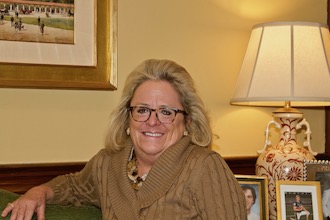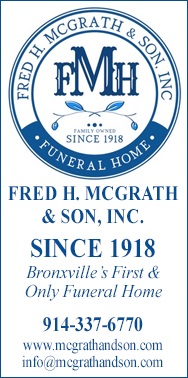From the Mayor: New State Budget Shortchanges Local Governments

By Mary C. Marvin, Mayor, Village of Bronxville
Apr. 26, 2017: The recently passed state budget had minimal effects on our village. The provision most important to small communities like Bronxville is AIM, or state aid to municipalities.
The fund, a revenue source to cover the cost of the over 200 unfunded state mandates, has been level or smaller every year since 2008, creating a $133 million reduction in dollars delivered to local governments statewide.
Just as the annual increases in school district aid have helped districts comply with the tax cap or maintain certain services, municipal governments need and deserve comparable yearly increases.
Other legislation our bipartisan New York State and Westchester County mayors' associations advocated for were either ignored or grossly underfunded.
So as not to have to rely on the whims of Albany or sometimes beg for direct financial aid mentioned above, we continue to support legislation that would prohibit the enactment of statutory or regulatory mandates that impose a direct or indirect local financial burden unless an appropriation is made sufficient to hold each local government harmless from any part of a new fiscal burden.
In addition, all current unfunded mandates should be required to sunset in two years unless they prove their existence as an essential service and a funding source is allocated to offset the expenditure.
In New York, unfunded mandates cost in the hundreds of millions of dollars and have become the "go to" backdoor way of increasing local property taxes, the most regressive form of government taxation. It is particularly important to stem these in Westchester, as we live in the highest-taxed county in the country.
Further, to decrease the burden on the local property taxpayer, the Conference of Mayors urged that the state, at local option, allow us to impose charges on tax-exempt properties to defray even a portion of the cost of the services local governments provide. While municipalities currently have limited authority to impose user fees to cover some of the expenses incurred (hence the trend in many communities to create lighting, paving, and curbing districts that can then charge all beneficiaries of the improvements through a usage formula), we are prohibited from charging for the most costly services, including police and fire protection.
This past October, Gannett papers conducted an expansive study on tax exemptions in New York State and the effect on local governments.
Approximately $866 billion in property value is exempt from school and municipal taxes, and the number of wholly tax-exempt parcels in New York grew from 179,420 in 1999 to 219,602 in 2016, a 22% increase. The values of those properties have also more than doubled from $276 billion to $567 billion over the same time period. For villages, including our own, the average amount of tax-exempt property is one-quarter of the land within municipal boundaries.
As an interesting aside, in his very recent state of the city address, Yonkers Mayor Michael Spano asked his colleges and hospitals to voluntarily contribute 25% of what would be their tax obligations to help defray the cost of essential services provided.
Since local revenue streams are the only way to offset the financial burden on the local taxpayer, mayors also continually ask for permission to levy gross receipts taxes on utilities at a uniform rate. Currently, Yonkers, Buffalo, and Rochester have the ability to impose a 3% tax, while the rest of the state is capped at 1%. In addition, though New York City and the State of New York itself have recognized that most telecommunication is now wireless and have amended their statutes accordingly to include cellular phone service for taxable purposes, local governments are prohibited from doing the same for even the 1% we are allowed to collect from utilities. It is not only a major financial loss but patently unfair.
I write often about the 2% tax cap and the unintended but deleterious consequences that have already manifested themselves. The major disincentive is the impetus to repair our aging infrastructures, most notably water and sewer systems, since expenditure on them is "non-deductible from the tax cap, which, because of an inflation tie-in, is actually closer to a 1% cap.
Net-net, if a politician wants to garner good press or get elected or re-elected, they often opt to stay under the cap by neglecting the unsexy underground repairs of a community.
In the recent state budget, an additional $200 million was earmarked for water infrastructure. Though an admirable start, the number is woefully short of statewide needs. The state comptroller's report of 2014 cites three separate studies estimating a combined water/sewer infrastructure funding deficit of $10.7 billion. Infrastructure is critical to both a community's economic stability and improved quality of life and must be funded by a formula remotely tied to need.
Disappointed but not deterred, the New York State Conference of Mayors continues to lobby our elected officials on the issues that help to sustain our local communities.
Unfortunately, local governments to some politicians represent too many disparate types of people, so we are not a "special interest group" or a voting block that gets needed attention. We don't have membership dues, political action committees, and funds or drive folks to the polls. We are just the private property taxpayers who in the end fund it all!
I urge you to reach out to all of our elected officials, me included, and express your views, suggestions, and displeasures. The accepted understanding is that a personal letter or phone call to your representative at the district office level is most noticed. The hope is that if enough of us begin to actively engage in the process, change is possible.
Financial & Legal Assistance Directory
Hymes & Associates, CPA, P.C.
Our firm provides outstanding service to our clients because of our dedication to the three underlying principles of professionalism, responsiveness, and quality.
Listed as one of the 10 largest firms by The Westchester Business Journal, we serve clients throughout the tri-state area. By combining our expertise, experience, and
the energy of our staff, each client receives close, personal and professional attention.
Our high standards, service, and specialized staff spell the difference between our outstanding performance and other firms. We make sure that every client
is served by the expertise of our whole firm.
Hymes & Associates, CPA, P.C.
55 Pondfield Road
Bronxville, NY 10708
914-961-1200
914-961-1715 (Fax)
Website: www.hymescpa.com
Baillie & Hershman
44 Pondfield Road, Suite - 12
Bronxville, N.Y. 10708
Office: 914-337-6300
Matthew W. Kerner, ESQ.
Direct Dial: 914-337-6569
Email: This email address is being protected from spambots. You need JavaScript enabled to view it.
Fax: 914-337-6913
Suzanne M. Bloomer, Esq.
Direct Dial: 914-337-0142
This email address is being protected from spambots. You need JavaScript enabled to view it.
Baillie & Hershman provides comprehensive Real Estate legal services for buyers, sellers, current owners, real estate agents and lenders. We also handle estate planning, including the drafting of wills.
Griffin, Coogan, Sulzer & Horgan, P.C.
Attorneys and Counselors at Law
Griffin, Googan, Sulzer & Horgan, R.C.
Located in Bronxville, New York, Griffin, Coogan, Sulzer & Horgan, P.C. takes great pride in providing our clients with comprehensive, high quality legal services in a responsive manner. The firm concentrates its practice in real estate law with a primary focus on issues relating to real estate tax litigation (also known as tax certiorari), real estate transactions, valuation law, real property taxation and tax planning and real property tax exemption matters throughout New York State.
The firm serves as general counsel for several local cooperatives and represents clients in various issues relating to wills, trusts and estate planning.
51 Pondfield Road
Bronxville, NY 10708
(914) 961-1300
This email address is being protected from spambots. You need JavaScript enabled to view it.
Nobile, Magarian & DiSalvo LLP
We are hardworking and dedicated attorneys who, combined, have more than 150 years of experience delivering quality legal advice. Our cutting edge is our ability to enter both the conference room and the courtroom with strength. Our law firm provides legal representation and counsel for both individual and business clients on issues related to estate planning and administration, real estate law, litigation, and business law. Our practice areas include: Commercial Litigation, Business Law, Real Estate, Wills, Estate Planning, Trusts, Estate Administration, Living Wills, Health Care Proxies, Powers of Attorney, Not For Profits, and Employment Law.
111 Kraft Avenue
Bronxville, NY 10708
914-337-6300
Veneruso, Curto, Schwartz & Curto, LLP
Veneruso, Curto, Schwartz & Curto is dedicated to providing businesses and individuals with exceptional legal services customized to each client's needs and objectives. Practice areas include litigation, real estate, not for profit, wills and estate planning, land use and zoning, business and corporate, cooperative and condominium and real estate tax assessment litigation.
The Hudson Valley Bank Building
35 East Grassy Sprain Road, Suite 400
Yonkers, New York 10710
914-779-1100
Aegis Capital
Steve brings 40 years of investing experience to his role as Senior Managing Director at Aegis Capital Corp., a prominent national securities firm.














